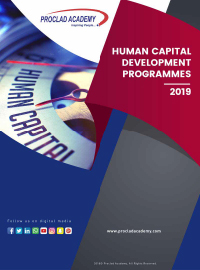Developing and Managing HR Processes, Culture & Change
| Ref No. | Dates | Venue | Fee (US$) | |
|---|---|---|---|---|
| HR 008 | 20 - 24 Jan 2020 | London | 5000 | Register |
| HR 008 | 13 - 17 Jul 2020 | London | 5000 | Register |
| HR 008 | 09 - 13 Nov 2020 | Amsterdam | 5000 | Register |
Developing and Managing HR Processes, Culture & Change
Introduction
Developing and Managing HR Processes, Culture & Change has never been more relevant. The environmental context in which organisations operate is continually changing, and therefore a culture which enables the organisation to be flexible, adaptable and changeable is essential. Culture has probably one of the biggest impact on organisational effectiveness, and the opportunity for sustainable performance than any other element of the organisation’s system. The primary goal of change management is to successfully implement new processes and business strategies while minimising negative outcomes.
This PROCLAD Academy’s training course highlights HR processes, culture and the challenges in managing major organisational change. The course focuses mainly on the scope and impact, steps to take to ensure the success of organisational change initiatives, and how to overcome common obstacles encountered. This exciting training course will bring you up-to-date on the latest techniques and approaches that are appropriate in effective management of Human Resources, Culture and Change.
The key features of PROCLAD Academy’s Developing and Managing HR Processes, Culture & Change training course are:
- Recognise opportunities for building strong employee relations
- The opportunity to review HR policies against best practice
- Having a strategy for supporting team leaders in delivering effective people management outcomes
- Understanding how to build an effective culture
- Supporting the organisation through change
Learning Objectives
By attending PROCLAD Academy’s highly interactive Developing and Managing HR Processes, Culture & Change training course, delegates will:
- Consider what effective HR processes looks like
- Identify the practical steps necessary to build strong employee relationships
- Review HR processes to ensure they contribute the best value to the business
- Explore the impact of their organisational culture and how to harness the benefits
- Identify how to build a strong coalition working towards positive organisational change
Target Audience
PROCLAD Academy’s Developing and Managing HR Processes, Culture & Change training course is designed for:
- Leaders and staff working in the personnel management or training sectors
- Line managers who want to develop their understanding of HR issues
- Anyone wishing to develop a career in personnel management and employee development
Training Methodology
PROCLAD Academy’s practical and results-oriented Developing and Managing HR Processes, Culture & Change training course is based on adult learning concept. It incorporates short inspiring lectures with structured lessons from the learning manual; captivating PowerPoint slides with videos to enhance learning; ongoing discussions with action planning; ample time for Q&A; training activities to reinforce key concepts within a fun learning environment.
Course Outline
- What does HR need to achieve?
- Why is it important?
- What is best practice HR management?
- Identifying the 4 pillars of best practice HR management
- The importance of having sound HR policies
- The psychological contract
- Managing conflicting interests
- Links between HR specialists in line managers
- Conducting an audit of HR processes
- Defining your employee resourcing strategy and approach
- Recruitment good practice and “right sizing” the organisation
- Ensuring grading structures work for the organisation
- Job evaluation techniques
- Planning for retirements
- Effective succession planning
- Defining your employee reward strategy
- Understanding the impact of your reward strategy
- Defining your employee development strategy
- Planning and managing employee development
- Evaluating training and Return on Investment
- Managing the training budget
- Building positive employee relationships through effective processes and policies
- Managing performance effectively
- Conducting a culture audit and understanding the findings
- Designing effective staff surveys
- Conducting pulse surveys
- Analyzing the data and learning the lessons
- Dealing with collective disputes
- Employee recognition
- Codes of conduct and ensuring compliance
- Understanding the stages of the change cycle
- Building commitment to change
- Identifying change enablers and blockers
- Assessing the teams’ readiness to engage with change
- Developing a coaching style of management


